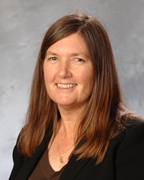- About Archives
- About SAA
- Careers
- Education
- Publications
- Advocacy
- Membership

Professional Experience: Program Officer, OCLC Research, 2008–present. Head of Special Collections and Archives, University of California, Irvine, 1995-2008. Head of Collections Cataloging, Getty Research Institute, 1992–1994. Special Collections Librarian, University of California, San Diego, 1985–1992. Prints and Photographs Division, Library of Congress, 1983-1985.
Education: BA, University of California, Irvine, 1974. MLS, University of California, Los Angeles, 1982.
Honors: Fellow, Society of American Archivists, 2000. Distinguished Librarian, University of California, 2000. Faculty Career Development Award, UC Irvine, 2000. C.F.W. Coker Award for Encoded Archival Description Development Team, 1998. Bentley Historical Library Mellon Research Fellowship with EAD Development Team, 1995.
Professional Activities: SAA: Council, 2000–2003. Program Committee, Chair, 2000. Nominating Committee, Chair, 1996–1997. RLG Roundtable, Co-chair, 2007–2008. Electronic Publications Working Group, Chair, 2005–2006. Committee to Elect SAA Fellows, 2004. Program Committee, 1999, ex-officio. Publications Board, 1994–1998, Chair, 1997–1998. Encoded Archival Description Working Group, 1995–2000. Program Committee, 1993. Committee on Archival Information Exchange, 1989–1992. Association of Research Libraries: Special Collections Working Group, since 2007. Association of College and Research Libraries, Rare Books and Manuscripts Section: Chair, 1993–1994. Vice Chair, 1992–1993. Executive Committee, 1989–1995. Digitization of Special Collections Task Force, 2008–2009. Core Competencies Task Force, 2005–2008. RBM: A Journal of Rare Books, Manuscripts, and Cultural Heritage, Editorial Board, 1999–2003. RBM Editor Search Committee, 2002-–2003. Bibliographic Standards Committee, 1984–1990, Chair, 1998-1990. Society of California Archivists: Host Committee, Chair, 2004. Rare Book School, University of Virginia: Co-instructor, “Introduction to Archives for Special Collections Librarians," since 2008. Online Archive of California: Various Advisory Groups, 1998–2005.
Publications: Taking our Pulse: The OCLC Research Survey of Special Collections and Archives, OCLC Research, 2010. “Viewpoint: How ‘Special’ Are Born-digital Collections?" Art Libraries Journal, 2010. “Ten Commandments for Special Collections Librarians in the Digital Age,” RBM: A Journal of Rare Books, Manuscripts, and Cultural Heritage, 2009. “The Evolution of Descriptive Standards in the United States,” Proceedings of the Third Congress on Databases, Associação dos Archivistos Brasileiros, 2009. Editor, Encoded Archival Description: Context, Theory, and Case Studies, SAA, 1998. (First published as two issues of American Archivist, Vol. 60, Nos. 3 and 4.)
Question posed by the Nominating Committee: Describe how SAA's draft "Core Values of Archivists" fits with your vision for the Society and how you would implement that vision.
First, a question for you: Have you read the draft Core Values of Archivists? If not, I highly recommend that you do; it may truly make your day to be reminded of the full range of principles and ideals that guide us in our life’s work. I’m a big fan of the power of words, and here are some of my favorite bits (with slight paraphrasing). Values embody what a profession stands for. Archivists preserve essential parts of the cultural heritage. The symbolic value of knowing that records exist is meaningful even to those who don’t directly use them. We foster accountability and transparency, which are essential hallmarks of democracy. We document and preserve on behalf of the broadest range of members of society, including those whose voices have been overlooked or marginalized. We provide authentic, reliable evidence to enable (among other things) insights into the human condition. We preserve for the benefit of the future, not just to record the past.
After reading the statement, I thought, hmmm: so what is its relationship to our Code of Ethics? Supplement or replacement? The Code, which is pithy and direct rather than lofty, states most of the same points, adding four preemptory cautions: We don’t let our personal beliefs get in the way. We don’t profit from our privileged access. We don’t alter, manipulate, or destroy data or records for nefarious purposes (or any other, I would hope). We don’t break the law. Do you need to be told those things? Almost certainly not, but every profession needs an ethics document, perhaps even more for external purposes than as a cautionary directive to practitioners.
How should SAA implement a vision that reflects core values? Are there obvious holes in the Society’s current strategic priorities (technology, diversity, and advocacy), which supplement the incredible array of “business as usual” activities of our plethora of sections, roundtables, and committees, not to mention the amazing output of a small but formidable executive office staff? Such work is never done, and that’s where our core values come in: they keep our course of action aligned by enabling clear vision.
The daily newspapers regularly inform us of political and societal issues on which SAA should (and does) speak truth to power. Governments and other institutions experience records-based crises that SAA can use to both support the archivists who are directly affected and offer wise counsel, or perhaps a civil tongue lashing, to organizational leaders who perpetrate poor practice. Graduate students in archival programs express strong opinions about how our professional society can help them learn and thrive, and SAA’s leaders must both listen carefully and act productively. More than 40 pages of strategic priorities documentation testify to the extraordinary level of energy with which the SAA Council is responding to countless such needs and events. It would be an honor to join them and engage closely with current ideas and actions.
The preamble to the statement of core values includes this: “Since ancient times, archives have afforded a fundamental power to those who control them.” They must therefore be controlled wisely and capably. Perhaps that’s our most important message. Let’s be sure we deliver it: individually and collectively, internally and externally, clearly and widely.